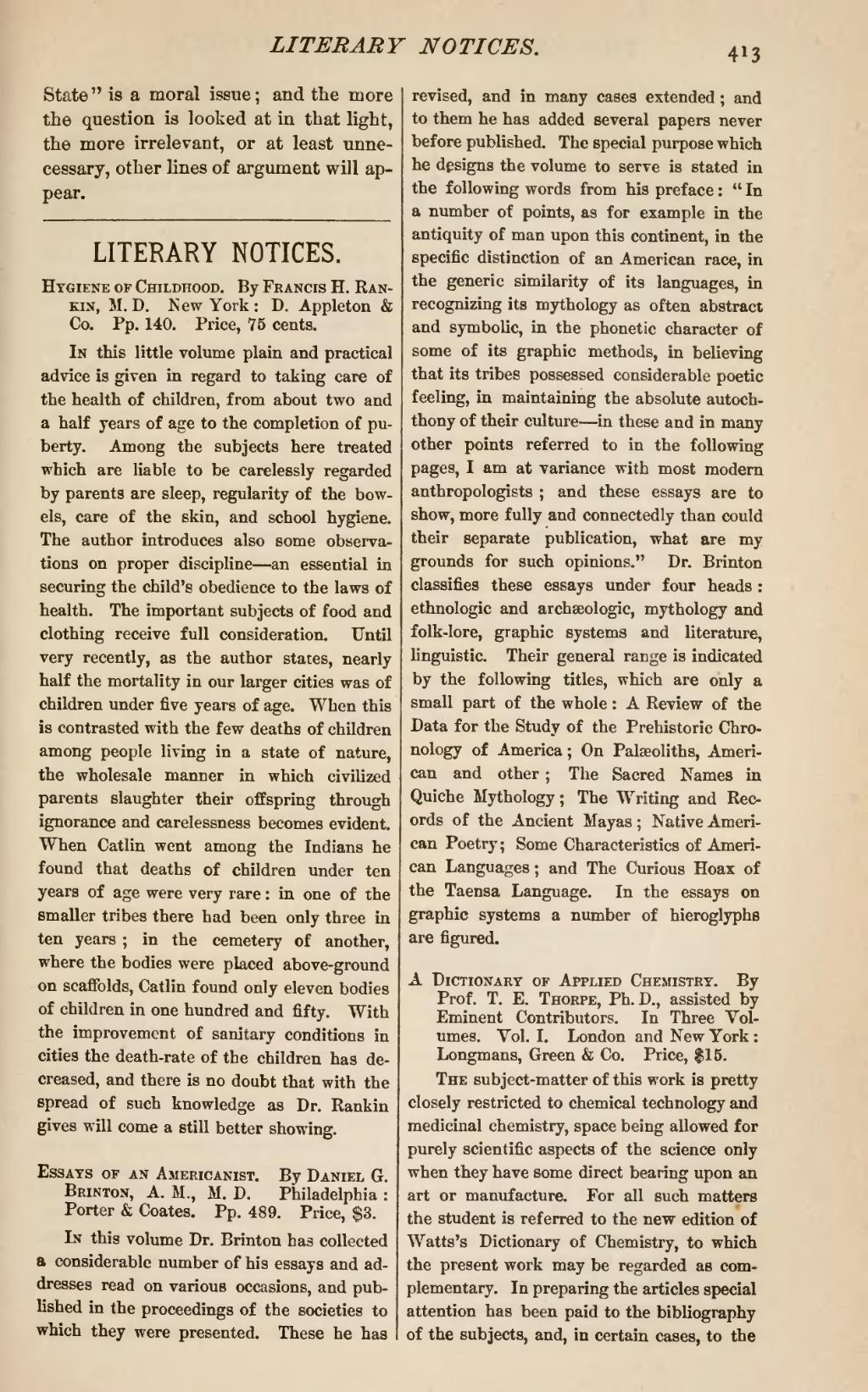State" is a moral issue; and the more the question is looked at in that light, the more irrelevant, or at least unnecessary, other lines of argument will appear.
Hygiene of Childhood. By Francis H. Rankin, M. D. New York: D. Appleton & Co. Pp. 140. Price, 75 cents.
In this little volume plain and practical advice is given in regard to taking care of the health of children, from about two and a half years of age to the completion of puberty. Among the subjects here treated which are liable to be carelessly regarded by parents are sleep, regularity of the bowels, care of the skin, and school hygiene. The author introduces also some observations on proper discipline—an essential in securing the child's obedience to the laws of health. The important subjects of food and clothing receive full consideration. Until very recently, as the author states, nearly half the mortality in our larger cities was of children under five years of age. When this is contrasted with the few deaths of children among people living in a state of nature, the wholesale manner in which civilized parents slaughter their offspring through ignorance and carelessness becomes evident. When Catlin went among the Indians he found that deaths of children under ten years of age were very rare: in one of the smaller tribes there had been only three in ten years; in the cemetery of another, where the bodies were placed above-ground on scaffolds, Catlin found only eleven bodies of children in one hundred and fifty. With the improvement of sanitary conditions in cities the death-rate of the children has decreased, and there is no doubt that with the spread of such knowledge as Dr. Rankin gives will come a still better showing.
Essays of an Americanist. By Daniel G. Brinton, A. M., M. D. Philadelphia: Porter & Coates. Pp. 489. Price, $3.
In this volume Dr. Brinton has collected a considerable number of his essays and addresses read on various occasions, and published in the proceedings of the societies to which they were presented. These he has revised, and in many cases extended; and to them he has added several papers never before published. The special purpose which he designs the volume to serve is stated in the following words from his preface: "In a number of points, as for example in the antiquity of man upon this continent, in the specific distinction of an American race, in the generic similarity of its languages, in recognizing its mythology as often abstract and symbolic, in the phonetic character of some of its graphic methods, in believing that its tribes possessed considerable poetic feeling, in maintaining the absolute autochthony of their culture—in these and in many other points referred to in the following pages, I am at variance with most modern anthropologists; and these essays are to show, more fully and connectedly than could their separate publication, what are my grounds for such opinions." Dr. Brinton classifies these essays under four heads: ethnologic and archæologic, mythology and folklore, graphic systems and literature, linguistic. Their general range is indicated by the following titles, which are only a small part of the whole: A Review of the Data for the Study of the Prehistoric Chronology of America; On Palæoliths, American and other; The Sacred Names in Quiche Mythology; The Writing and Records of the Ancient Mayas; Native American Poetry; Some Characteristics of American Languages; and The Curious Hoax of the Taensa Language. In the essays on graphic systems a number of hieroglyphs are figured.
A Dictionary of Applied Chemistry. By Prof. T. E. Thorpe, Ph. D., assisted by Eminent Contributors. In Three Volumes. Vol. I. London and New York: Longmans, Green & Co. Price, $15.
The subject-matter of this work is pretty closely restricted to chemical technology and medicinal chemistry, space being allowed for purely scientific aspects of the science only when they have some direct bearing upon an art or manufacture. For all such matters the student is referred to the new edition of Watts's Dictionary of Chemistry, to which the present work may be regarded as complementary. In preparing the articles special attention has been paid to the bibliography of the subjects, and, in certain cases, to the

